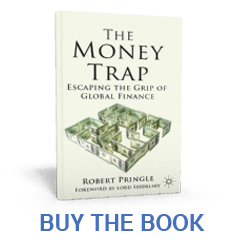Three major failures contributed to the global financial car crash
• There was a failure of banking and bankers – imprudence and irresponsibility, tinged with instances of criminal behaviour, insider trading, mis-selling, deceit and fraud;
• There was a failure of central bankers – they were seduced into assuming the self-stabilising properties of markets, neglecting the conditions under which markets are self-stabilising;
• There was a failure of governments – a failure to tackle the build-up of private and public sector debt, as easy access to finance from central banks and markets allowed them to avoid hard decisions.
One feature is common them all – lack of discipline on the actors. Sufficient discipiline can come from external constraints on sovereignty, which will be embraced once we recognise that this is an international crisis with common international causes. And it is a financial crisis with financial system causes.
Critics say, it is absurd to think we can reform the international monetary system. It is ‘politically impossible’.
Mrs Thatcher showed up such arguments for once and all. I remember it well. Before she arrived in 1979, the cognoscenti agreed it was impossible politically to do what she had said she would do, especially given the post war commitment of all political parties to ‘full employment’.
Everything is ‘politically impossible’ until it happens, then everybody says that it was ‘inevitable’.
The case for sharing sovereignty is well put by Lorenzo Bini-Smaghi in his CEPS booklet “Austerity”:
“The difficulty of carrying out structural reforms at the national level, because of strong vested interests, is a compelling motive for a country to resort to external constraints on its sovereignty.”
He also sums up neatly the political conditions for agreement on such rules:
“To transfer sovereignty it must be clear to everybody that the exercise of power at the national level is inefficient and creates problems that can be resolved only through centralisation”
I would just add that exactly the same argument can be used to elevate cooperation and sharing of sovereignty to the global level, and that this should be the way forward.
Military power and global currency
Will the financial superpower of the future need nuclear weapons and battleships to enforce fulfilment of contract and make its currency ‘respected’?
The British had their gunboats, but didn’t actually use them to enforce contracts (with the possible exception of the war against Egypt in 1882 which, some scholars claim was prompted by Prime Minister Gladstone’s desire to promote the interests of bondholders). But generally British governments took the line that the City of London was on its own, and investors should take risks without recourse to the military power of the Empire. The gold standard was a voluntary arrangement, as was the dollar standard of the 20th century. Doubtless creditors were aware of UK and US power as a pervasive background factor, and knew it would be risky to tweak the tiger’s tail. I did hear the late, great Sir Dennis Weatherstone, a senior official of JP Morgan (and a Brit), say in 1982 that if Mexico, Brazil and other debtor countries deliberately defaulted on their debt, that would be theft, and a foreign policy issue for the US. But there was (so far as I am aware) no serious consideration given in Washington to bombing Mexico City or Brasilia to persuade them to fulfil their debt contracts to US banks. Fear of being cut off from access to capital markets, or having to pay more for borrowing, were in normal times sufficient incentives to good behaviour. So it can be again.
Indeed, nowadays it may be a liability for a currency to be issued by a government of one country, however powerful in a military sense, if it has excessive public debts and has difficulty in servicing them. America is now flirting with default. The very idea will strike creditors as immoral. A fiat money depends utterly on trust. The dollar will never be the same again.
Yet the way President Obama has brought in President Putin to broker and enforce a deal with Syria on destroying its arsenal of chemical weapons is instructive. Dividing the world into power zones, with each superpower ‘looking after’ the obligations of its clients, and enforcing them, may point to a model for finance as well.
A global currency will be deemed by many to be ‘politically inconceivable’ until the moment it comes into existence, at which time it will be declared to have been always ‘inevitable’.
A paperback edition of ‘The Money Trap”, with a new Preface, is due to be published next month.

